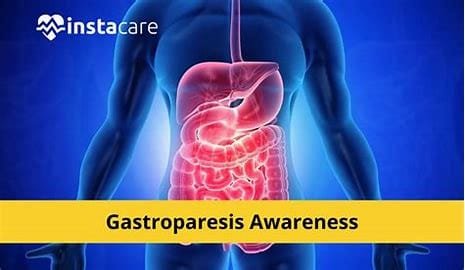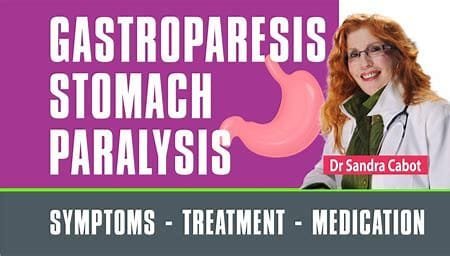Introduction

Gastroparesis is the paralysis of stomach muscles. The gastric motility does not properly occur because of the damage to stomach muscles, thus impairing food from the stomach into the small intestine. The condition interferes with the normal process of digestive disorders by bringing forth an uncomfortable set of sometimes debilitating symptoms. Knowledge about gastroparesis, causes, symptoms, and treatments helps control the condition.
The stomach muscles, in a normal digestive process, contract to push the ingested food into the small intestine for further digestion. However, in people diagnosed with gastroparesis, the motility of stomach muscles is hampered. As a result, the movement of food can either become slow or stop all together. This results in the accumulation of food in the stomach and leads to secondary manifestations like nausea, vomiting, and abdominal pain. The impact of gastroparesis on the quality of life is often massive, as proper nutrition cannot easily be maintained.
Causes of Gastroparesis
Gastroparesis has several possible causes, although sometimes the cause remains unknown, and this condition is referred to as idiopathic gastroparesis. Key causes include:
Diabetes: The most common cause of gastroparesis is diabetes, particularly type 1 and advanced type 2 diabetes. High blood sugar levels over time can damage the vagus nerve that controls stomach muscles.
When this nerve is damaged, stomach motility slows down, and symptoms of gastroparesis occur.
Surgery: It depends on the type of surgical procedures; some gastric surgery and especially esophagectomy may damage the gastric nerves or muscles that maintain normal motility. Other gastric surgeries, such as fundoplication or bypassing the stomach, lead to gastroparesis.
Viral Infections: Viral infections, including Epstein-Barr virus or herpes simplex virus, can lead to transient or permanent gastroparesis via the disruption of gastric function. In some cases, they resolve spontaneously; in others, the gastroparesis persists.
Medications: Certain medications can delay stomach emptying. These include narcotics, antidepressants, or anticholinergics. If the symptoms are mild, stopping or changing these medicines may help.
Neurological Conditions: Such diseases as Parkinson’s disease, multiple sclerosis, and other similar neurological diseases affect nerve activity. Many of these neurologic conditions damage autonomic nerves responsible for the uncontrolled movement of the stomach and other portions of the intestines.
Other Disorders: Autoimmune diseases, hypothyroidism, and other metabolic diseases are other disorders related to gastroparesis. Such diseases can disturb normal gastric movement and therefore delay stomach emptying.
Gastroparesis Symptoms
The symptoms of gastroparesis may be mild or severe. This depends on the severity of impaired motility within the stomach. Common symptoms include the following: Nausea and Vomiting: The most common symptoms are persistent nausea and vomiting. Food in the stomach for an extended period will cause discomfort and the need to vomit.
Abdominal Pain and Bloating: Pain or discomfort in the upper abdomen and a feeling of bloating are common. The slow movement of food can lead to a feeling of fullness even after small meals.
Early Satiety: Feeling full quickly after starting a meal is an indication of gastroparesis. This symptom can even affect the nutritional intake because the patient would rather avoid meals to prevent discomfort.
Acid Reflux: Food that stays in the stomach for a long time can cause burning sensations in the chest or throat due to acid reflux.
Malnutrition and Weight Loss: In severe cases, gastroparesis may lead to malabsorption of nutrients and also cause unintentional weight loss as patients cannot take in sufficient nutrition because of symptoms.
Tests for gastroparesis diagnosis

Doctors can use several tests to diagnose gastropexies.
Gastric Emptying Study: This is the most common test applied. A patient is asked to ingest a meal with minimal radioactive material. The food is then followed by imaging through the digestive tract in order to study the emptying of the stomach.
Upper Endoscopy: An endoscope will be used to see inside the stomach to rule out other possible causes for symptoms such as ulcers or blockages.
SmartPill: A sensor-laden capsule swallowed to monitor pH, pressure, and temperature changes in the GI tract can provide information on how long it takes for food to pass through the stomach.
Treatment of Gastroparesis
Management of gastroparesis involves lifestyle modifications, diet, medication, and even surgery in severe cases.
1. Dietary changes
More Frequent, Smaller Meals: The burden on the stomach for digestion can be relieved by eating smaller meals more frequently.
Low-Fiber, Low-Fat Diet: Fiber and fat slow down the process of digestion. A low-fiber and low-fat diet is generally recommended to decrease the severity of symptoms.
Fluids and pureed foodstuffs Liquid calorie intakes are less taxing on the digestive system than any form of solid food; soups, smoothies, and pureed foods are advised.
Medicines
Prokinetics: Metoclopramide and erythromycin may be administered that would stimulate the gastric muscles and make food movement.
3. Advanced Treatments
Gastric Electrical Stimulation: It has a surgically implanted device that sends electrical pulses to the stomach muscle to improve motility and stimulate the digestive activity.
Jejunostomy Tube: feeding tubes are placed through a surgical procedure in the small intestine for the most severely affected patients, administering nutritional support directly into the small intestine without having the need to pass by the stomach.
Parenteral Nutrition: For a patient who cannot take his or her oral intake, intravenous nutrition will ensure that the necessary nutrients reach him or her directly in the bloodstream.
Management of Gastroparesis

Living with gastroparesis can be quite challenging, but most patients learn to live an otherwise fulfilling life if appropriately managed. Follow-up from the healthcare providers, dietary restriction, and management of symptoms contribute significantly. Indeed, the quality of life improves when there is a combination of treatments that can help free patients from complications.
Although it is still a very complex condition, research continues to be conducted in the hopes of making the disease better understood and more readily treatable. With this choice to make good decisions and the care taken for individualization, patients diagnosed with gastroparesis are able to maintain symptoms under control while leading an overall balanced, healthy lifestyle.



